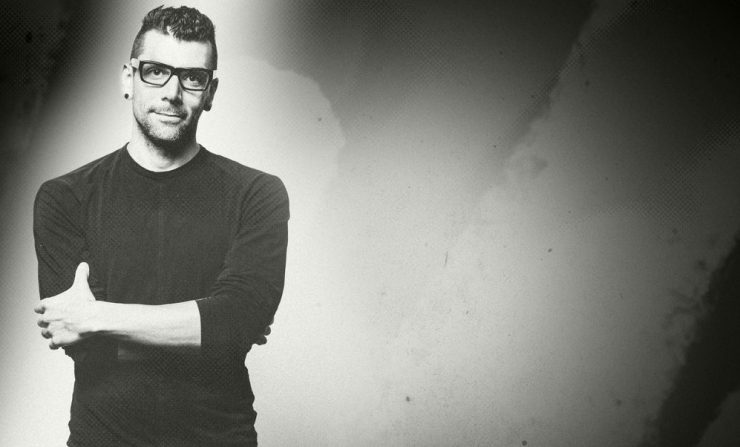In the Land of Canaan wants to show that children with disabilities are a blessing
When it’s done right, documentary can inspire a kind of empathetic engine in its audience, and that’s exactly what Joey Papa hopes to accomplish with In the Land of Canaan. Named after Papa’s daughter who passed away at the age of three last October, the film was the next logical step for Papa, who first unpacked his experiences through a series of video blogs. As Papa’s first filmmaking effort outside of his work for Skies Fall, In the Land of Canaan will retrace his own experiences, just as it hopes to explore the trials and lessons of other families with children with disabilities. Papa also intersperses trips throughout the country with footage of vast, idyllic landscapes, transcendental steps towards his ultimate goal: Showing that children with disabilities are a blessing.
Papa, who is based out of Racine, first turned to Indiegogo in Feb, and is now seeking funds for finishing touches and a Jun release. In addition to planning several screenings throughout Wisconsin, Papa also plans to live-stream the film for FREE on Jun 25. On the eve of a trailer launch, I talked with him about his goals with his project:
You have a lot of experience speaking through JoeyTalks, your YouTube channel, but what is your experience directing films?
I’ve been involved with big brands like GE and Intel, so a lot of it’s been commercial work along those lines. Before this project, I was already working with a production house in the area and when my daughter passed away, I switched tracks a bit, so this is my first venture into documentary.
On your Kickstarter page, you talk a lot about “what [Canaan] came to say.” What about the documentary format seemed right for finding those answers?
From my perspective, the norm towards children with medical complications and special needs is from a place of pity, the age old phrase “you never wish that upon yourself.” While you never want to see your child suffer, I had a suspicion that the transformative work Canaan had done in my life was a commonality in families with children with disabilities, and so that’s what I’m looking to explore. Do families feel this way? Has their child had that same level of transformation in their personal lives? The documentary is an exploration, it’s an uncovering, and it’s investigative. I’m hoping to find a common thread throughout all the different stories.
This film isn’t just about your experiences but other families’ as well. How did you find them?
Some of them were personal friends from years ago that are not currently in my life. Others I found through media. One child has developed pediatric cancer and another has a genetic degenerative disease. With Jaxon “Strong” Buell down in Florida, a friend shared his story with me. When he was born, he was only given a few days, if not a few hours, to live so he’s considered a living medical miracle because he’s almost 2 years old now. I reached out to his dad, and it was almost an instant joining of vision and heart.
With these “transformative” experiences and your emphasis on spirituality, In the Land of Canaan deals a lot with the intangible. How do you plan to show that cinematically?
With the title, Canaan is my daughter but Canaan also represents a place of promise, a place of the miraculous, a place that is beyond heaven or whatever. It is a realm in which there is peace and love. So there’s that element.
The film will also follow life cycles. In order to break up real life and this heavy subject matter, we’re going to use breaking points. The life cycle begins in conception, then birth, life, death and rebirth and with each of those subjects, we take a three to five minute recess. Within those three to five minutes, we use lots of ethereal shots to communicate on a more philosophical level what those ideas are about. When we talk about conception, we’re not just talking about biblical conception but conceiving an idea or conceiving love for another person. And also landscapes, all of which are from original footage. Because we’re talking about the land of Canaan, there’s macro-shots of light, of items coming together. That’s one of my big things. A lot of documentaries I’ve seen lack artistic expression.
Even with documentaries, there’s an inherent argument being made no matter how objective the filmmaker might think he or she is. How will your experiences with Canaan affect your approach?
I am literally seeking out answers in interviews, because I actually don’t know. I have my answers which are obviously very subjective, but I wanted to know from other people who have gone through horrific experiences with their children’s health. And truthfully, there were so many similarities, and these are all in different locations. Florida, Tulsa, OK, Colorado Springs, Racine. I’m the narrator of the documentary, and my daughter and her story is interwoven throughout so you will follow me. It’s a discovery process and some of the discovery is validating, but at the same time, the viewer will feel like they’re walking arm-in-arm with me. There’s many times in it where a person will say something and I can’t hold myself together, and sometimes it’s the most obscure thing. I ask one woman what’s the hardest part of having children with medical complications and she took a while to answer and eventually got it out and said “the loneliness” and as soon as she said that, something just interrupted me. I had never thought that before. Stuff like that is all throughout the documentary.
- You can find more information on In the Land of Canaan at its Kickstarter page. The film is slated for a Jun 25 release.

